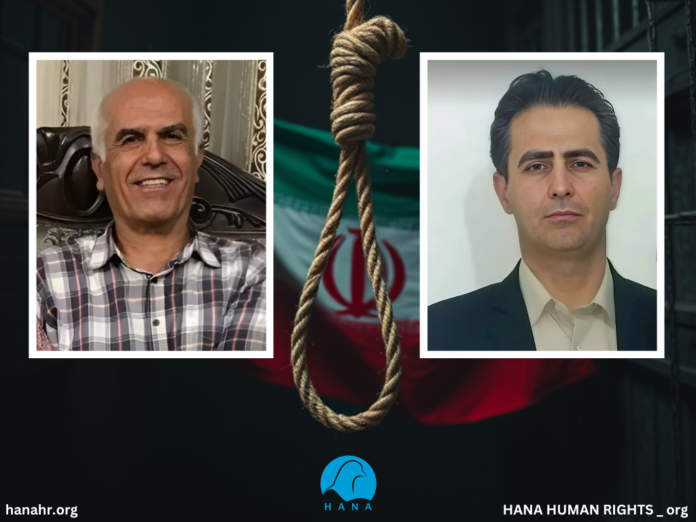According to reports received by the Hana Human Rights Organization, two political prisoners sentenced to death, Behrouz Ehsani Eslamloo and Mehdi Hassani, remain in the secure ward of Qezel Hesar Prison despite the suspension of their execution.
Their continued detention, in addition to being a clear violation of fair trial principles, is indicative of the Iranian judiciary and security apparatus’s ongoing repressive policies. This report examines the legal proceedings, current status, detention conditions, human rights violations, and urgent appeals to international bodies.
Section One: Personal Information and Arrest Process
- Behrouz Ehsani Eslamloo
• Age: 70 years
• Date of Arrest: November 2022
• Place of Arrest: Tehran
• Interrogation Process: Subjected to intense interrogations for over three and a half months in security detention centers
• Post-Interrogation Detention: Transferred to Ward 4 of Evin Prison - Mehdi Hassani
• Age: 48 years
• Date of Arrest: September 2022
• Place of Arrest: Zanjan
• Interrogation Process: Held in Ward 209 of Evin Prison under the supervision of the Ministry of Intelligence
• Interrogation Conditions: Subjected to psychological pressure and intensive interrogations in closed security environments
Section Two: Legal Proceedings and Sentencing
In September 2024, Branch 26 of the Tehran Revolutionary Court, presided over by Judge Iman Afshari, sentenced both prisoners to death.
The charges against them included:
• Baghi (armed rebellion against the government)
• Moharebeh (waging war against God)
• Armed action against the government
• Efsad-e Fil-Arz (corruption on earth)
• Membership in the People’s Mojahedin Organization of Iran (PMOI/MEK)
• Collecting classified information
• Assembly and collusion against national security
On January 26, 2025, their case was referred to the Enforcement of Sentences Unit, and on January 27, 2025, the Supreme Court accepted their request for a retrial, suspending their execution. However, prison authorities have refused to transfer them to the general ward.
Section Three: Current Status and Detention Conditions
• Date of Transfer: January 26, 2025
• Current Place of Detention: Secure Ward, Unit 3, Qezel Hesar Prison
Conditions in the Secure Ward
This ward is typically designated for prisoners awaiting execution. Its conditions include:
• Confinement in small solitary cells
• Severe restrictions on communication with the outside world
• Lack of access to proper medical and legal services
Despite the suspension of their execution, judicial and security authorities have prevented their transfer to the general ward. This action is not only illegal but also raises concerns about the possibility of a secret execution.
Heshmatollah Hayat al-Gheib, the head of the Tehran Prisons Organization, has played a direct role in the decision to keep these prisoners in the secure ward but has not provided any clear explanation for this decision.
Section Four: Human Rights Violations and International Concerns
- Violation of Fair Trial Principles:
Their continued detention in the secure ward after the suspension of their execution is a clear violation of fair trial principles under both Iranian law and international human rights commitments, including the International Covenant on Civil and Political Rights. - Risk of Secret Execution:
The history of the Iranian judiciary indicates that transferring political prisoners to security wards can be a prelude to carrying out executions in secrecy. This has caused serious concern among families and human rights organizations. - Psychological Torture:
Prolonged solitary confinement, especially with no access to legal counsel and severe communication restrictions, constitutes psychological torture and can have devastating effects on the prisoners’ mental health. - Denial of Visitation Rights:
The families of Behrouz Ehsani Eslamloo and Mehdi Hassani have repeatedly requested visits, but their requests have been denied. This not only violates Iranian law but also contravenes fundamental human rights principles regarding prisoners’ rights.
Section Five: Urgent Appeals to the International Community
Given the critical situation of these two prisoners, the Hana Human Rights Organization calls on international bodies, human rights organizations, and the global community to:
- Pressure the Iranian government to uphold its international human rights commitments, particularly regarding the suspension of executions and the end of arbitrary detentions.
- Demand the immediate and unconditional release of Behrouz Ehsani Eslamloo and Mehdi Hassani.
- Send fact-finding missions and UN special representatives to inspect Qezel Hesar Prison and assess the conditions of these prisoners.
- Launch international campaigns to raise global awareness about their case and the plight of other political prisoners in Iran.
- Pursue legal action in international forums, including the UN Human Rights Council and committees addressing torture and arbitrary detentions.
The cases of Behrouz Ehsani Eslamloo and Mehdi Hassani exemplify systematic human rights violations in Iran. Hana Human Rights Organization will continue to monitor their case closely and provide updates as new information emerges. We firmly believe that only through international pressure and global solidarity can we prevent further human rights abuses and the risk of secret executions.
Hana Human Rights Organization
February 1, 2025

